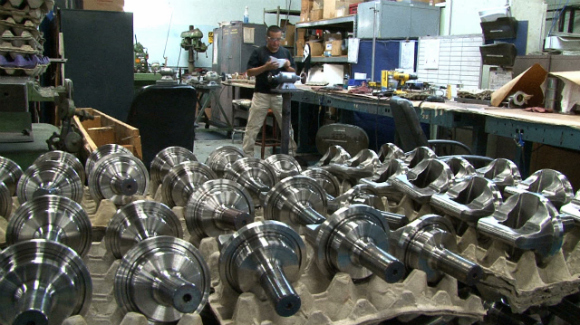
(Photo Credit: John Guenther)
Jobs may be roaring back in some California cities, but the recovery isn’t just uneven, it’s also not enough—not yet.
Poverty rates have doubled over the last two decades in regions like the Inland Empire, where less than one in five residents have a college degree. Meanwhile, even fast-growing regions can’t always find the workers they need: The state is projected to face a shortfall of 2 million skilled workers in the next decade, especially in the expanding high-tech manufacturing sector.
As co-chairs of the California Economic Summit Steering Committee, we view this conundrum—and this potential opportunity—as one of the state’s preeminent challenges. It will also be the focus of our first conversation at the Summit’s August 12 Capitol Day, where a group of more than 200 civic leaders will discuss how the state can help quickly grow California’s workforce—and its manufacturing sector, in particular—to meet the needs of diverse regional economies.
For the last year, this has been the work of three Summit action teams—Workforce, Capital, and Advancing Manufacturing—that have been trying to better connect state resources, and private capital, with more robust regional workforce pipelines.
All three teams have enjoyed several notable successes: A $50 million boost in the state budget for community college career technical education programs, a promising new plan to bring federal and state agencies together to expand access to capital for small businesses, and a new federal designation for a Southern California aerospace consortium as one of 12 national “manufacturing communities” with access to $1.3 billion in federal funds.
What’s next—and how the Summit can help
On Capitol Day, Summit leaders will connect with lawmakers and state officials about what the state can do next to quickly grow California’s workforce—and how the Summit can help. Speakers leading the day’s workforce discussion include:
- Assemblymember Jose Medina
- Kish Rajan, director of the Governor’s Office of Business and Economic Development (GO-Biz)
- Jose Anaya, statewide sector navigator of the California Community Colleges initiative, Doing What Matters for Jobs and the Economy
- Kris Costa, articulation liaison of the Academic Senate for California Community Colleges
- Mark J. Roberts, CEO of Springboard Biodiesel (Moderator)
These workforce training experts will focus on three questions, in particular:
- How can businesses—especially manufacturers—communicate the specific skills they need in workers?
- What can the state do to ensure smaller businesses have access to the capital they need to employ them?
- What can the state’s community colleges, especially, do better to prepare students for these jobs?
We believe finding answers to these questions will be vital to California’s prosperity in the decades to come. This work begins on Capitol Day. Please check out the rest of the day’s program—and we look forward to seeing you there.
Paul Granillo is the president and CEO of the Inland Empire Economic Partnership and a member of the California Stewardship Network.
Eloy Oakley is the superintendent-president of Long Beach City College and a member of the California Forward Leadership Council. Together, they are co-chairs of the California Economic Summit Steering Committee.
—————–
The California Economic Summit is a project of California Forward and the California Stewardship Network. For more information about Capitol Day, please email info@caeconomy.org or call us at 916-382-8799.

